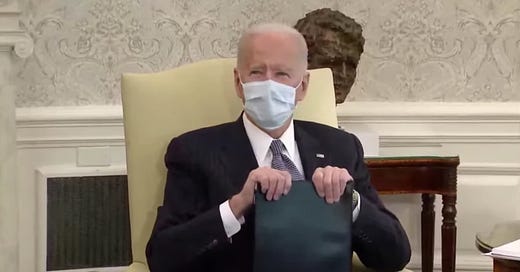It seems we have arrived at yet another edition of our depressingly long-running series, "JUST GIVE US THE MONEY."
The subject this time is, once again, the federal COVID relief bill currently making its way through Congress. To their credit, Democrats appear to have mostly decided that it is pointless to arrive at a grand bargain with Republicans over the bill (the GOP's laughable opening offer almost certainly helped) and are going it alone. The House and the Senate both passed measures this week that would allow Congress to push the bill through using the reconciliation process as a way of getting around a Republican filibuster, and even useless people like Joe Manchin are getting on board.
Great, right? Well, just because Republicans might not be as much of an issue anymore doesn't mean that Democrats can't negotiate against themselves to try and cut back the price tag of the $1.9 trillion bill. Is there any evidence that people in America are clamoring for the bill to be cut? Nope: a recent Quinnipiac poll found a whopping 68 percent of respondents giving the bill the thumbs up. But "everyone supports this" has never stopped Democrats before, so they are seriously contemplating going after the bill's most high-profile component: the $1,400 stimulus checks. The latest thinking: why not restrict the number of people who would get the checks?
From the Washington Post (emphasis mine):
The latest proposal Democrats are considering would send $1,400 payments to individuals earning $50,000 or less and $2,800 to married couples earning $100,000 or less.
[...]
About 71 percent of Americans would get the full benefits and another 17 percent would get the partial benefit, according to Kyle Pomerleau, a fellow at the American Enterprise Institute who specializes in tax policy. This is less than Biden’s initial proposal for the payments to go to individuals earning up to $75,000 and married couples earning up to $150,000, which would result in about 85 percent getting full payments.
So 14 percent fewer people would get the full $1,400 check (which should be $2,000, but let's not even go there.) That's tens of millions of people getting less money, or no money at all. Again, there is no particular evidence that anybody out in the country is asking for this; the same Quinnipiac poll found 78 percent support for the stimulus checks, the political equivalent of "kittens are nice" or "the troops." No, the checks might be cut back because that's what supposedly serious politics is about: being stingier for no reason. If the income thresholds are decided based on 2019 tax results, as the checks in the CARES Act were, this could leave some of the millions of people whose financial circumstances went off the deep end in 2020 at even more of a loss.
Biden pronounced himself open to this on Wednesday, as the New York Times reported:
“We can’t walk away from an additional $1,400 in direct checks, because people need it,” Mr. Biden told the House Democrats, according to the people, who detailed the conversation on the condition of anonymity because the discussion was intended to be private. “I’m not going to start my administration by breaking a promise to people.”
But he added, “We can better target the number — I’m OK with that.”
A wonderful message, that: "We will NOT abandon you, we will NOT break our promises, except that actually for tens of millions of you we will not be giving you the money, but it's because of something called 'targeting.'" Inspiring. I wonder which is politically more dangerous: sending lots of people money, or driving home the message for months that people will get money and then telling tens of millions of them that, sorry, they don't deserve it anymore.
Meanwhile, other vitally needed aspects of the bill, like paid leave or the $15 minimum wage, are also in peril, thanks to the complex restrictions of the reconciliation provisions, and Democrats have already accepted that the levels of unemployment aid in the bill will be lower than before.
This is not to damn the bill to oblivion. It is simply to say that it would be nice not to live in a country where $700 billion military bills were waved through without a moment's thought but relief measures that we can afford and that will help people must be subjected to 17 rounds of scrutiny, even in the middle of a pandemic and an economic meltdown that is still sending staggering numbers of people to the unemployment line every week. The firehose of money in the CARES Act may not have been the most "targeted" in economic history. It also kept millions out of poverty, and surely helped millions more who found their circumstances thrown into turmoil by the pandemic.
There is nothing wrong with handing out money in an emergency and taxing rich people to get some of it back. There is nothing wrong with just saying, "yes, we will give people money right now, and if some richer people get the money, that's not the worst thing in the world." There is nothing wrong with sending money out to people and applying the well-worn conservative principle that they can be trusted with it. There is nothing wrong with helping people right now.
Instead, even a decent bill like this must be put through the wringer, and nipped and trimmed and sanded away, lest—horror of horrors—a single person who doesn't "deserve" it get a penny from the government. Even a measure supposedly grounded in compassion must be fed into the cruelty machine that is the American state.





